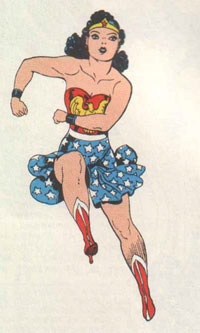 |
| Tim Hanley is researching the changing image of Wonder Woman. (Danny Abriel Photo) |
Wonder Woman has an image to keep upâone of a strong, fierce and devastatingly beautiful Amazon. Itâs no wonder that Beyonce has said she wants to play the superhero on the big screen.
The two seem made for each other: the feisty singer of Independent Women and the superhero who kicks Nazi butt with red high-heeled boots.
And yet, says Dalhousie masterâs student Tim Hanley, while Wonder Woman may be regarded as a feminist icon, that image isnât upheld in the comic books through all seven decades of her existence. Although she started out ahead of her time in the 1940s as the original Amazon princess feminist, she certainly didnât stay that way.
This is especially true from the 1950s through to the â70s when Wonder Woman regressed as a superhero. With comic books being blamed for the moral decline of American youth, Wonder Woman in the 1950s spent more time mooning over her boyfriend Steve Trevor than fighting bad guys. In the â60s, her intriguing origin story was revamped and she lost many of her powers. In the â70s, she started a clothing boutique and became completely helpless in the face of male advances.
âBy the early 1970s, Wonder Woman became a feminist icon in the wider world and the image stuck, even though that image wasnât really borne out in the comics,â explains Mr. Hanley, who is doing his thesis in history on Wonder Woman. She appears on the cover of the first issue of Gloria Steinemâs Ms. magazine in July 1972 and gets her own TV show starring the Barbie-doll proportioned Lynda Carter in 1975.
Interestingly, Wonder Woman started out during the Second World War as a superhero who was considered superior to male superheroes because she was a woman. Under the pseudonym Charles Moulton, psychologist William Marston created Wonder Woman for DC Comics in 1941 as a counterpoint to all the men wearing tights, including Green Lantern, Batman and Superman. From the island home of the immortal Amazons, Wonder Woman possessed great strength and was aided by bizarre gadgets such as bulletproof bracelets, a telepathic tiara and a magic lasso that forced people obey her.
âNot even girls want to be girls so long as our feminine archetype lacks force, strength and power. Not wanting to be girls, they donât want to be tender, submissive, peace-loving as good women are,â explained the Harvard-educated Dr. Marston in 1943. âWomenâs strong qualities have become despised because of their weakness. The obvious remedy is to create a feminine character with all the strength of Superman plus all the allure of a good and beautiful woman.â
 |
| Wonder Woman as drawn by H.G. Peter. |
As one of the inventors of the âsystolic blood-pressure test,â an early lie detector test, Dr. Marston was convinced that women were more honest and reliable than men.
âHis belief was that men needed to submit to women because women, being more loving and peaceful, were better equipped to lead us to a peaceful society,â says Mr. Hanley, 23.
âWonder Woman was strong, self reliant and she flipped the typical view of women on its head. Look at Lois Lane at the same time, for example. Even though she was really cool in that she was a single woman with a job in the 1930s, she existed to fulfill the damsel in distress role for Superman. But in Wonder Woman, it was Steve Trevor whoâd get into tight spots with the Nazis and Wonder Woman would be there to bail him out.â
The Dalhousie student deliberately uses the word âsubmitâ when talking about Wonder Woman. Drawn in a muscular style by H.G. Peter, the early comic books are rife with images of female domination, bondage and subjugation. Wonder Woman herself would lose her powers and free will when her bracelets were bound together.
âWonder Woman went over really well; sheâd sell better than Superman and Batman,â says Mr. Hanley. âAnd nine out of 10 readers were boys.â
âMarston believed he was tapping into menâs subconscious desire to submit to a strong woman. But mostly, Wonder Woman was a good comic. It was exciting and action-oriented.â
